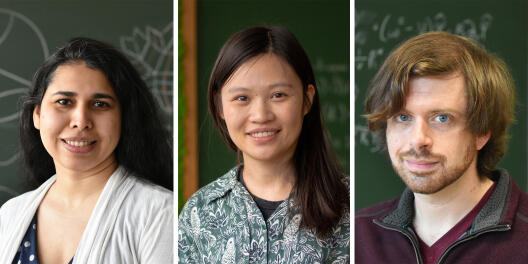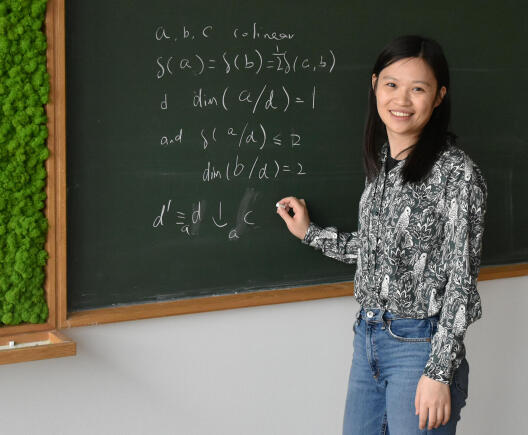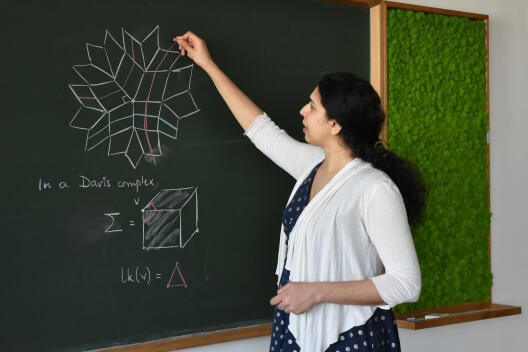The hurdles are high but the motivation is higher

The hurdles are high but the motivation is higher: despite the Corona pandemic, the Cluster of Excellence Mathematics Münster is attracting a high number of scientists from all over the world.
Dr. Bakul Sathaye from India, Dr. Tingxiang Zou from China and Dr. Christopher Kauffman from the USA are three of 29 international postdocs currently undertaking their research at Mathematics Münster. In their guest articles, the three postdocs share their passion for mathematics and provide insight into their careers and and feelings throughout the pandemic in Münster.
New approaches to solving mathematical problems
Guest article by Dr. Tingxiang Zou
In fact, I would not have imagined I would become a mathematician one day. When I started my undergraduate studies at Peking University in China, I was more into philosophy and sociology. I was fascinated by understanding how human cognition works, or rather what are the constraints of it. In order to explore the natural science perspectives as well, I took basic mathematics courses. Since then, I have been trapped in mathematics.

I am working on a branch of pure mathematics called model theory. Unlike most other areas of mathematics, model theory doesn’t have specific mathematical objects to study. Rather, it is a tool that is built upon mathematical logic and has been developed during the last few decades to approach existing mathematical problems in new, creative ways. I am currently working on further developing a tool based on asymptotic counting of points on finite structures. My findings are primarily useful to the mathematical community. I believe that mathematics justifies its own existence and doesn’t have to rely on applications, although it is a key tool for many natural and social sciences.
Before I came to Münster, I completed my master's degree at the University of Amsterdam, followed by PhD studies at the University of Lyon and a one-year research stay at the Hebrew University of Jerusalem. Since October 2020, I have been part of the Model Theory Group at the Cluster of Excellence Mathematics Münster, where I will stay for three years.
Starting during the corona pandemic was challenging - especially since I moved to Münster with my daughter. However, the University of Münster and the Cluster supported us well, for example in finding a place at a kindergarten and with the paperwork. Now I'm looking ahead full of energy and am excited to continue my work in an excellent research environment. At the moment, I miss the social and academic interactions in person. On the other hand, the many digital opportunities allow me to participate in seminars and conferences worldwide.
What supports me most in my career is the cooperative study and work environment. The patience and humbleness of most mathematicians I have met have encouraged me a great deal. For me, the most valuable part of being a mathematician and a researcher is that it gives me a feeling of doing something on solid ground, something that is simply there and has a relatively weak connection with no-matter-who’s ego.
Exploring the "boundaries" of infinite spaces
Guest article by Dr. Bakul Sathaye
My research is in areas of mathematics called geometric group theory and geometric topology. These lie at the interface of three broad areas: geometry, topology and algebra. I was already interested in geometry at school, but learning in college about the ideas of limits and infinity and how they are dealt with in mathematics, was eye opening. Another turning point in my path towards choosing to do research in geometry was to learn about non-Euclidean geometry.
Since then I have been fascinated by spaces of nonpositive curvature. In my research, I explore what happens at the "ends" or "boundary" of these infinite spaces. These aspects often reveal a lot about the space itself. For this, I use tools from group theory. The study of such spaces has applications in theoretical physics and can help understand the nature of our universe.

My interest in theoretical mathematics was furthered by my time at the Indian Institute of Technology (IIT) in Bombay, India. I did my master's degree there before going on to do my PhD at Ohio State University in Columbus, USA. Then I did a postdoc at Wake Forest University in North Carolina. Later, I spent a year at Ben Gurion University in Israel before joining the Cluster of Excellence Mathematics Münster. The decision to come to Münster was a no brainer for me: the conditions for young researchers are very good and there are many mathematicians whose work is close to my research interests. My time in Münster will certainly help me grow as a mathematician.
I was fortunate to meet inspiring and encouraging people along my path who have helped me to crack open the rigid exterior of mathematics and see the beauty that lies within. I hope I can do the same for the young students I will teach in Münster.
I have been in Germany since October. Of course, the Corona pandemic brought some challenges with it. I received a lot of help from the University of Münster’s Welcome Centre and through the Cluster’s Buddy Programme. In mathematics, a lot of ideas are shared and collaborations are initiated in coffee lounges and informal gatherings around seminars. Of course, the pandemic has put a damper on these activities. Nonetheless, I am communicating with my fellow researchers as best as I can.
I am yet to truly experience the city of Münster. I'm already looking forward to visiting the weekly market. It's certainly a wonderful place to be on Saturday mornings! I am very happy to be in a bike and pedestrian-friendly city - this means that many professional discussions can currently take place outdoors.
Painting a fuller picture of black holes’ surroundings – with mathematics
Guest article by Dr. Christopher Kauffman
As far back as I can remember I've seen it as a possibility I would become a mathematician and researcher. When I was in university, I actively started pursuing it. I think the most beautiful aspect about being a mathematician is the ability to unify problems coming from many different areas, so that you can hopefully find a framework that gives deeper insight into multiple problems at once.

I'm working in partial differential equations, with a focus on problems arising from general relativity. I'm currently looking at the behavior of waves near rotating black holes. Specifically, when you look at the behavior of these waves, you immediately run into the issue that the energy might be focused in a certain region, called the photon sphere, for an arbitrarily long amount of time. I'm working on a slight modification of the traditional wave equation which throws this problem into sharp relief and looking for a way to analyze the equation that works around the issue.
My research findings would probably be most beneficial to physicists. We can't fully determine how a particular phenomenon will behave near a black hole but partial stability results like the one I'm working on will hopefully allow people to paint a fuller picture of what's happening.
I did my undergraduate studies at the University of Rochester in western New York, then went to graduate school at Johns Hopkins University. After I graduated, I briefly worked at Southern Methodist University, then moved to England to do research at Imperial College London. There, I was working as a postdoc under Prof. Dr. Gustav Holzegel. When he moved to the University of Münster last year, he wanted to set up a research group quickly, so he invited me to join him.
I moved here knowing only a little German, so the language barrier has been the most persistent challenge. Navigating the rental market has also been somewhat of a pain. Beyond that, everything's gone very smoothly. The city is beautiful, as is the surrounding countryside, and the public market is very nice. I hope to be able to see more of the city soon!
Contact details Christopher Kauffman
Links:
Article "Interesse am Forschungsstandort Münster ist groß" in the university's newspaper "wissen I leben" [de], May 2021 (p. 3).

